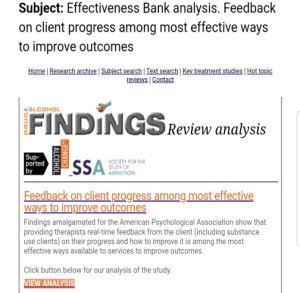 Would you believe me if I told you there was a way you could more than double the chances of helping your clients? Probably not, eh? As I’ve documented previously, claims abound regaring new methods for improving the outcome of psychotherapy. It’s easy to grow cynical.
Would you believe me if I told you there was a way you could more than double the chances of helping your clients? Probably not, eh? As I’ve documented previously, claims abound regaring new methods for improving the outcome of psychotherapy. It’s easy to grow cynical.
And yet, findings from a recent study document when clinicians add this particular practice to their clinical work, clients are actually 2.5 times more likely to improve. The impact is so significant, a review of research emerging from a task force of the American Psychological Association concluded, “it is among the most effective ways available to services to improve outcomes.”
That said, there’s a catch.
The simple nature of this “highly rated,” transtheoretical method belies a steep learning curve. In truth, experience shows you can learn to do it — the mechanics — in a few minutes.
But therein lies the problem. The empirical evidence makes clear successful implementation often takes several years. This latter fact explains, in part, why surveys of American, Canadian, and Australian practitioners reveal that, while being aware of the method, they rarely integrate it into their work.
What exactly is the “it” being referred to?
Known by the acronym FIT, feedback-informed treatment (FIT) involves using standardized measures to formally and routinely solicit feedback from clients regarding progress and the quality of the therapeutic relationship, and then using the resulting information to inform and improve care.
The ORS and SRS are examples of two simple feedback scales used in more than a dozen randomized controlled trials as well as vetted and deemed “evidence-based” by the Substance Abuse and Mental Health Services Administration. Together, the forms take less than 3 minutes to administer, score and interpret (less if one of the web-based scoring systems is used).
So why, you might wonder, would it take so long to put such tools into practice?
 As paradoxical as it may sound, because FIT is really not about using measures — any more say than making a home is about erecting four walls and a roof. While the structure is the most visible aspect — a symbol or representation — we all know it’s what’s inside that counts; namely, the people and their relationships.
As paradoxical as it may sound, because FIT is really not about using measures — any more say than making a home is about erecting four walls and a roof. While the structure is the most visible aspect — a symbol or representation — we all know it’s what’s inside that counts; namely, the people and their relationships.
On this score, it should come as no surprise that a newly released study has found a significant portion of the impact of FIT is brought about by the alliance or relationship between client and therapist. It’s the first study in history to look at how the process actually works and I’m proud to have been involved.
Of course, all practitioners know relationships skills are not only central to effective psychotherapy, but require lifelong learning. With time, and the right kind of support, using measurement tools facilitates both responsiveness to individual clients and continuous professional development.
Here’s the rub. Whenever I respond to inquiries about the tools — in particular, suggesting it takes time for the effects to manifest, and that the biggest benefit lies beyond the measurement of alliance and outcome — interest in FIT almost always disappears. “We already know how to do therapy,” a manager replied just over a week ago, “We only want the measures, and we like yours because they are the simplest and fastest to administer.”
Every so often, however, the reply is different. “What do we have to do to make this work to improve the effectiveness of our clinical work and clinicians?” asked Thomas Haastrup, the Coordinator of Family Services for Odense Municipality in Denmark. When I advised, planning and patience, with an emphasis on helping individual practitioners learn to use feedback to foster professional development versus simply measuring their results, he followed through. “We adopted the long view,” Thomas recounts, “and it’s paid off.” Now in their 5th year, outcomes are improving at both the program and provider level across services aimed at helping adults, children, and families.
In addition to the Manual 6 in the ICCE Treatment and Training manuals, the ICCE Summer Intensives offer several opportunities for helping you or your agency to succeed in implementing FIT. First, the 2-day FIT Implementation Training — the only workshop offering in-depth, evidence-based training in the steps for integrating FIT into clinical practice at the individual, agency, and system-of-care level. Second, the Deliberate Practice Intensive — here you not only learn the steps, but begin to set up a professional develop plan designed to enhance your effectiveness.
To help out, I’d like to offer a couple of discounts:
- Purchase Manual 6 at 70% off the regular price. Click here to order. Enter the word IMPLEMENTATION at checkout to receive the discount (If you want to purchase the entire set, I’m making them available at 50% off the usual price. Enter IMPLEMENTATION2 at checkout).
- Register for any or all of the summer intensives by May 1st and receive an additional discount off the early bird price. Simple enter the code FITPROMOAPRIL at checkout. Please note, registration MUST occur before May 1st. Generally, we sell out 6 to 8 weeks in advance.
Feel free to email me with any questions. In the meantime, as always, I’m interested in your thoughts about FIT and DP.
Until next time,
Scott
Scott D. Miller, Ph.D.
Director, International Center for Clinical Excellence




Leave a Reply